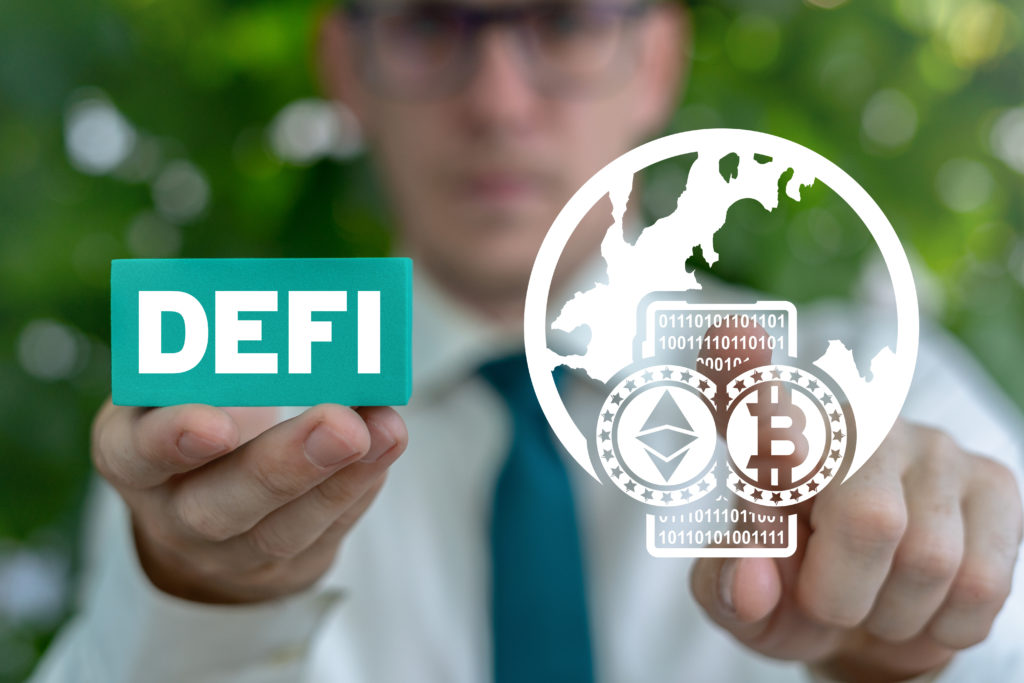
Maybe you’ve heard that Bitcoin is trading north of $35,000. Or, a bunch of your techie friends are constantly bringing up blockchain technology, while all you want to do is recap Sunday’s football game as they roll their eyes. They may have even hit you on a recent Zoom call with the latest buzz word in the world of crypto… “DeFi”
DeFi is short for “Decentralized Finance,” an umbrella term for a variety of financial applications in cryptocurrency and blockchain geared toward disrupting intermediaries. It draws inspiration from blockchain, the technology behind the digital currency bitcoin, which allows several entities to hold a copy of a history of transactions, meaning it isn’t controlled by a single, central source. That’s important because centralized systems and human gatekeepers can limit the speed and sophistication of transactions while offering users less direct control over their money. DeFi is distinct because it expands the use of blockchain from simple transfers to more complex financial uses.
Bitcoin and many other digital assets stand out from legacy payment methods, such as those run by Visa and PayPal, in that they remove all middlemen from transactions. When you pay with a credit card for coffee at a café, a financial institution sits between you and the business, with control over the transaction. They retain the authority to stop or pause it and record it. With bitcoin, those institutions are excluded from the transaction.
Direct purchases aren’t the only type of transaction or contract overseen by big companies; financial applications such as loans, insurance, crowdfunding, derivatives, betting and more are also in their control. Cutting out middlemen from all kinds of transactions is one of the primary advantages of DeFi. Before it was commonly known as decentralized finance, the concept was often referred to as “open finance”.
The most popular types of applications include:
Decentralized exchanges (DEXs): Online exchanges help users exchange currencies for other currencies, such as U.S. dollars or Bitcoin . DEXs are becoming a very popular type of exchange, which connects users directly to trade cryptocurrencies with one another without using an intermediary.
Stablecoins: A cryptocurrency that’s tied to an asset outside of cryptocurrency (the dollar or euro, for example) to stabilize the price.
Lending platforms: These platforms use smart contracts to replace intermediaries, such as traditional banks, that manage lending in the middle.
Is investing in DeFi Safe?
No, it’s still quite risky! Many believe DeFi is the future of finance and that investing in the disruptive technology early could lead to massive gains. But it’s difficult for newcomers to separate the good projects from the bad. And, there has been plenty of bad. As DeFi has increased in activity and popularity through 2020, many DeFi applications, such as meme coin YAM, have crashed and burned, sending the market capitalization from $60 million to $0 in just 35 minutes! Other DeFi projects have faced a similar fate, resulting in many investors losing a lot of money.
In addition, DeFi bugs are unfortunately still very common. Smart contracts are powerful, but they can’t be changed once the rules are baked into the protocol, which often makes bugs permanent and subsequently increasing risk.
A Safer Way to Invest in Blockchain
Blockchain is the record-keeping technology behind cryptocurrency. Unlike the use of cryptocurrencies as a standalone investment, broader blockchain technology entails less volatility and provides investors a more streamlined exposure to cryptocurrency and other emerging uses. (e.g. mass scale micropayments and applications that allow, for instance, a new musician to cut out the expense of a middleman and go directly to the consumer).
Currencies, such as Bitcoin and Ethereum, have garnered much attention and excitement, but investing in them is challenging, time-consuming and entails significant volatility. Everyone who is thinking about buying crypto should first, learn about when, how and why they should buy it, along with the associated risks involved.
The ‘Demand Blockchain’ portfolio is designed as a comprehensive investment solution. It has exposure to over 50 companies that are actively involved in the development and utilization of blockchain technologies. Although a significant portion is allocated to the blockchain industry, we also ensure that your portfolio is globally diversified, which reduces the volatility that can be prevalent in the blockchain sector.
Are you interested in investing in the evolution of blockchain technology as part of a diversified investment strategy? If so, we are here to help! Open an account here or schedule a Zoom conference with one of our advisors today.
This report is a publication of Demand Wealth. Information presented is believed to be factual and up-to-date, but we do not guarantee its accuracy and it should not be regarded as a complete analysis of the subjects discussed. All expressions of opinion reflect the judgment of the author as of the date of publication and are subject to change.
